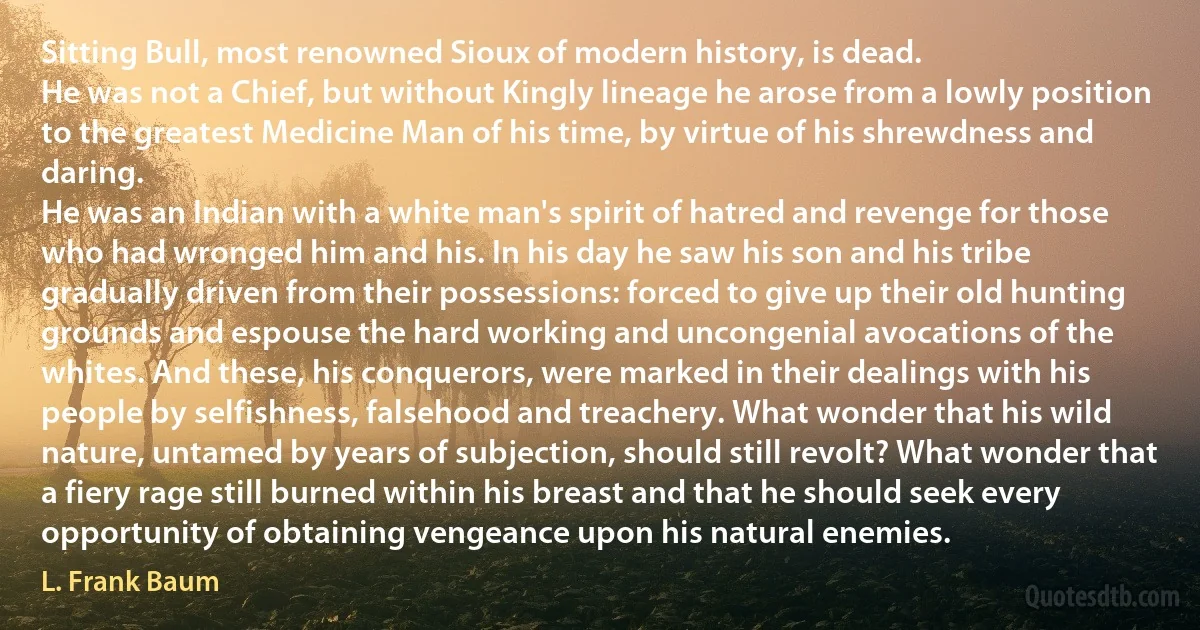Subjection Quotes
Those who keep the masses of men in subjection by exercising force and cruelty deprive them at once of two vital foods, liberty and obedience; for it is no longer within the power of such masses to accord their inner consent to the authority to which they are subjected. Those who encourage a state of things in which the hope of gain is the principal motive take away from men their obedience, for consent which is its essence is not something which can be sold.

Simone Weil
Accepting the view that man was prior in the creation, some Scriptural writers say that as the woman was of the man, therefore, her position should be one of subjection. Grant it, then as the historical fact is reversed in our day, and the man is now of the woman, shall his place be one of subjection?

Elizabeth Cady Stanton
Antony ... used to say that it behooved a man to give all his time to his soul rather than his body, yet to grant a short space to the body through its necessities; but all the more earnestly to give up the whole remainder to the soul and seek its profit, that it might not be dragged down by the pleasures of the body, but, on the contrary, the body might be in subjection to the soul.

Athanasius of Alexandria
Because men that are free, well-born, well-bred, and conversant in honest companies, have naturally an instinct and spur that prompteth them unto virtuous actions, and withdraws them from vice, which is called honour. Those same men, when by base subjection and constraint they are brought under and kept down, turn aside from that noble disposition, by which they formerly were inclined to virtue, to shake off and break that bond of servitude, wherein they are so tyrannously enslaved; for it is agreeable with the nature of man to long after things forbidden, and to desire what is denied us.

François Rabelais
Her affection for him was now the breath and life of Tess's being; it enveloped her as a photosphere, irradiated her into forgetfulness of her past sorrows, keeping back the gloomy spectres that would persist in their attempts to touch her-doubt, fear, moodiness, care, shame. She knew that they were waiting like wolves just outside the circumscribing light, but she had long spells of power to keep them in hungry subjection there.

Thomas Hardy
The machine is a slave which serves to make other slaves. Such a domineering and enslaving drive may go together with the quest for human freedom. But it is difficult to liberate oneself by transferring slavery to other beings, men, animals, or machines; to rule over a population of machines subjecting the whole world means still to rule, and all rule implies acceptance of schemata of subjection.

Gilbert Simondon
In the Stuart era, the English developed for themselves, without foreign participation or example, a system of Parliamentary government, local administration and freedom of speech and person, clean contrary to the prevailing tendencies on the continent, which was moving fast toward regal absolution, centralized bureaucracy, and the subjection of the individual to the State.

G. M. Trevelyan
He who does not realize to what extent shifting fortune and necessity hold in subjection every human spirit, cannot regard as fellow-creatures nor love as he loves himself those whom chance separated from him by an abyss. The variety of constraints pressing upon man give rise to the illusion of several distinct species that cannot communicate.

Simone Weil
The reproduction of labour power thus reveals as its sine qua non not only the reproduction of its ‘skills' but also the reproduction of its subjection to the ruling ideology. ... It is in the forms and under the forms of ideological subjection that provision is made for the reproduction of the skills of labour power.

Louis Althusser
First, I say, that woman in her greatest perfection was made to serve and obey man, not to rule and command him. As St. Paul does reason in these words: "Man is not of the woman, but the woman of the man. And man was not created for the cause of the woman, but the woman for the cause of man; and therefore ought the woman to have a power upon her head" [1 Cor. 11:8-10] (that is, a cover in sign of subjection). Of which words it is plain that the apostle means, that woman in her greatest perfection should have known that man was lord above her; and therefore that she should never have pretended any kind of superiority above him, no more than do the angels above God the Creator, or above Christ their head. [38] So I say, that in her greatest perfection, woman was created to be subject to man.

John Knox
If England is to remain supreme, she must be able to appeal to the coloured against the white, as well to the white against the coloured. It is therefore not merely as a matter of sentiment and of justice, but as a matter of safety, that we ought to try and lay the foundation of some feeling on the part of coloured races towards the crown other than the recollection of defeat and the sensation of subjection.

Robert Gascoyne-Cecil, 3rd Marquess of Salisbury
The simple organization of a people into a national body, composite or otherwise, is of itself an impressive fact. As an original proceeding, it marks the point of departure of a people, from the darkness and chaos of unbridled barbarism, to the wholesome restraints of public law and society. It implies a willing surrender and subjection of individual aims and ends, often narrow and selfish, to the broader and better ones that arise out of society as a whole. It is both a sign and a result of civilization. A knowledge of the character, resources and proceedings of other nations, affords us the means of comparison and criticism, without which progress would be feeble, tardy, and perhaps, impossible. It is by comparing one nation with another, and one learning from another, each competing with all, and all competing with each, that hurtful errors are exposed, great social truths discovered, and the wheels of civilization whirled onward.

Frederick Douglass



